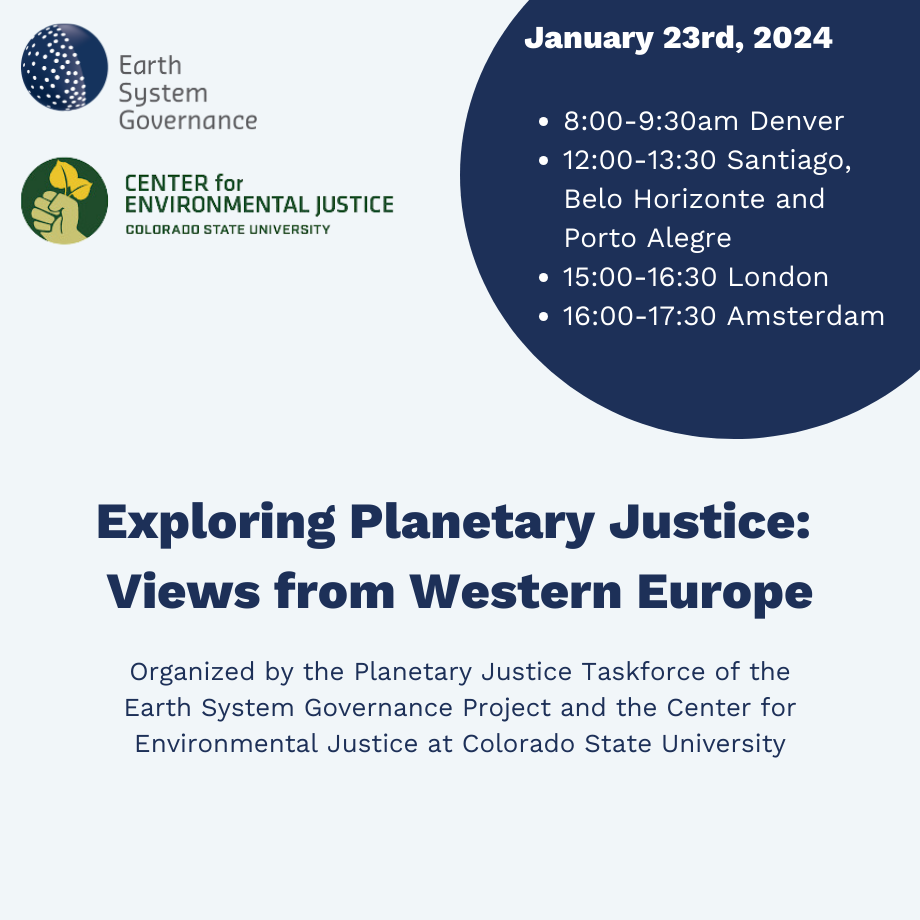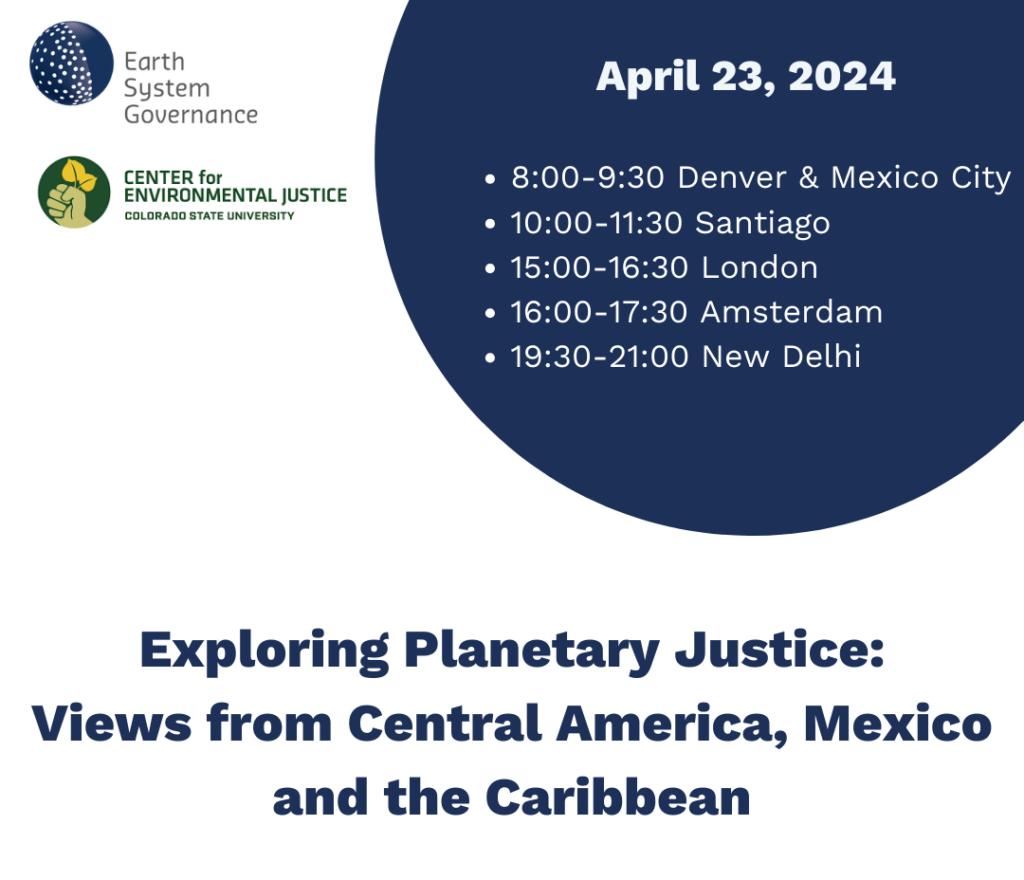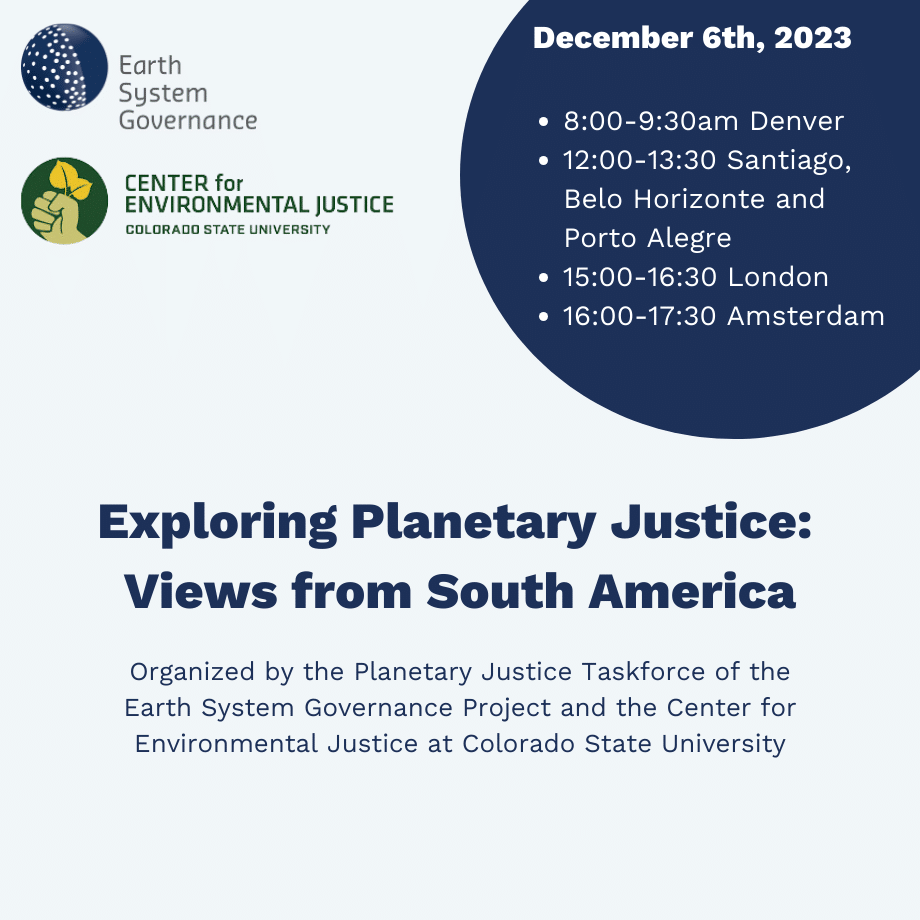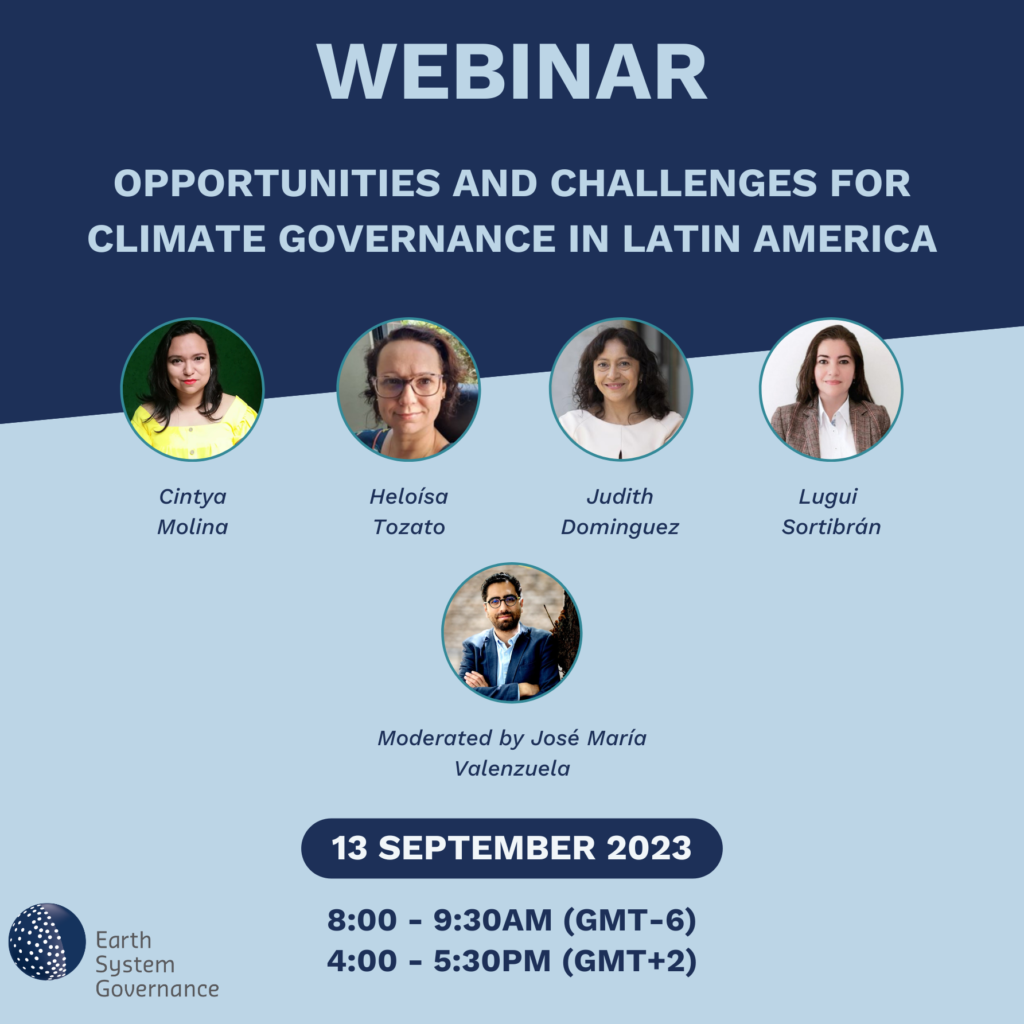On Tuesday, January 23rd, 2024, (8:00 to 9:30 am Denver time, 12:00 to 13:30 pm Santiago time, and 16:00 to 17:30 pm Amsterdam time) a webinar on Exploring Planetary Justice: Views from Western Europe will be held.
This webinar series is co-convened by Agni Kalfagianni, Stefan Pedersen, and Dimitris Stevis, and organized by the Planetary Justice Taskforce of the Earth System Governance Project and the Center for Environmental Justice at Colorado State University
Registration link and more information available below.
General Description
Intersecting social and environmental challenges are affecting and endangering the human and non-human realms on earth. This has intensified demands for justice, with some scholars proposing the concept of ‘planetary justice’. However, what exactly planetary justice means and whether this resonates with existing scholarship and practice of justice, especially in the ecosocial sense, is currently underexplored.
This joint initiative between the Earth System Governance project and the Center for Environmental Justice of Colorado State University aims at establishing an international network of researchers who are interested in exploring the place of planetary justice within their thinking and practice on ecosocial justice. For this reason we are conducting a series of webinars across different world regions under the title ‘Exploring Planetary Justice’. Participants are invited to address three main prompts drawing on their own research and experiences, which we will compare and synthesize at the end of the webinar series. Following a first webinar focusing on South America, this webinar will explore views from Western Europe.
This will be a 90-minute event with 60 minutes for panelist comments on the below prompts, and 30 minutes for questions and discussion.
Prompts
1. What do you see as the major theoretical and political tendencies within ecosocial justice in your region?
2. What are the forces for or against ecosocial justice in your region, in addition to the global or planetary levels?
3. Has the concept of Planetary Justice or something similar found its way into your region? How? What does Planetary Justice mean to you?
Carole-Anne Sénit is Assistant Professor of Inclusive Sustainability Governance with the Copernicus Institute of Sustainable Development at Utrecht University, The Netherlands. She is a political scientist by training, with a career spanning both research on and practice in the civil society sector. Her research explores justice issues from the perspective of the inclusion and representation of the Global South within civil society, science, and sustainability governance institutions at global level. She is a senior research fellow of the Earth System Governance Project, co-convenor of the project’s taskforce on the Sustainable Development Goals, and managing editor of the Earth System Governance journal. She obtained her PhD from Utrecht University, in joint supervision with IDDRI. Prior to her doctoral studies, she worked as a research fellow at CEVIPOF and IDDRI. She holds a 5-year integrated MSc in Political Science and Sustainable Development from Sciences Po Paris, and speaks French, English, and Spanish.
Florian Dünckmann, born in 1965, studied geography at the University of Kiel, where he completed his doctorate on the social impact of nature conservation measures in Brazil’s Atlantic coastal rainforest. In a project funded by the German Research Foundation, he then researched political change in rural communities in northern Germany. After interim positions at the Universities of Marburg, Tübingen and Lüneburg, he was appointed Professor of Political Geography at the University of Bayreuth in 2009. In 2010, he returned to his academic roots and took up a professorship in cultural geography at the Institute of Geography at Kiel University. He and his working group are currently researching social development in rural areas, among other things. Prof. Dünckmann is also a member of the Kiel School of Sustainability and the EnJust network for environmental justice.
Francesca Rosignoli (PhD 2016) is María Zambrano postdoctoral fellow at the Department of Public Law at the Universitat Rovira i Virgili in Tarragona (Spain), where she is also a member of the Research Group on Environmental Law, Citizenship and Sustainability, and researcher at the URV’s Centre for Environmental Law Studies of Tarragona (CEDAT). Her research interests include environmental justice, global environmental governance, climate change, climate-induced migration, and collective capabilities. Her current research focuses on climate change-induced migration from a gender perspective in the EU context. Her latest monograph, Environmental Justice for Climate Refugees, was published by Routledge in May 2022 and aimed at investigating the legal impasse surrounding the recognition of climate refugees through the lens of environmental justice. She is co-editor of the volumes ‘Climate Change Integration in the Multilevel Governance of Italy and Austria’ (Brill 2022) and ‘Racism, Environment, Health. Environmental Racism and Health Inequalities’ (PM 2022).
Brendan Coolsaet is FNRS Research Professor at UCLouvain (Belgium). He studies environmental (in)justice in Europe. Over the last decade, his research projects have focused on justice issues posed by environmental transitions and transformations linked in particular to the conservation of biodiversity, to food and agriculture, to land-use changes, and to rural development in Europe. He is a co-founder of the JUSTES research group in Belgium on social and ecological justice and an organising committee member of the French Environmental Justice network. He is the editor of Environmental Justice: Key Issues (Routledge 2020), the principal textbook in the field.
Sherilyn MacGregor is Professor of Environmental Politics at the University of Manchester. She researches relationships between environmental (un)sustainability and social (in)justice, applying insights from intersectional ecofeminist and other critical political theories. Some recent publications include: journal articles in Local Environment (MacGregor et al., 2023) Policy Studies (Tobin et al., 2023) and Environmental Politics (MacGregor 2021); the Oxfam report Caring in a Changing Climate (MacGregor et al., 2022); and the edited Routledge Handbook of Gender and Environment (MacGregor, 2017). She has been an editor of Environmental Politics journal for more than ten years.








